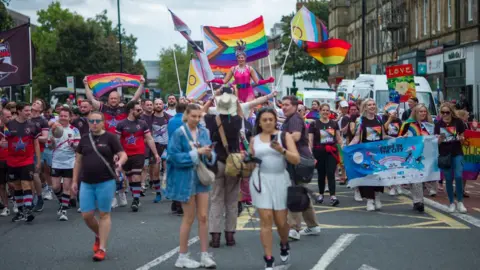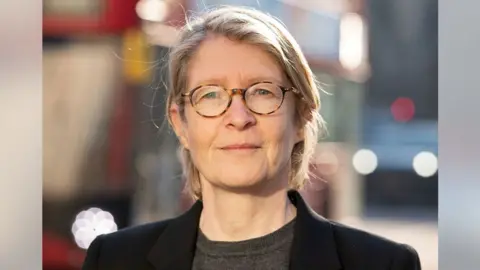Police force bans uniformed officers from Pride
 Getty Images
Getty ImagesA police force has banned uniformed officers from taking part in a Pride march after a High Court judge ruled its past participation was unlawful.
Northumbria Police has told on-duty officers they cannot take part in Newcastle Pride, while off-duty officers will no longer be allowed to wear clothing which identifies them as members of the force during the march.
However, the force said it would continue to run a community stall at the event, which begins on Saturday.
Northumbria Police said it believed there was a "legitimate policing purpose" for its engagement at the event as long as it did not "show support" for any political agenda.
"We feel the complete withdrawal of Northumbria Police engagement from such events would be a retrograde step and damage trust and confidence amongst members of LGBTQ+ community," a spokesperson said.
The force said its attendance at events such as Pride allowed it to build trust among minority communities, provide advice about its response to homophobic and transphobic hate crime, and promote recruitment opportunities.
New Pride policy
During the judicial review, Northumbria Police said it planned to scale back its involvement in Newcastle Pride this year, but had planned to allow off-duty officers to wear a T-shirts which identified them as members of The National LGBT+ Police Network.
Linzi Smith, the claimant in the initial legal case, threatened the force with further legal action if it did not cancel its plans.
The force has now issued new rules which state on-duty officers and staff will only be permitted at the Pride march as part of an "official policing response" and must be in uniform.
Off-duty officers are allowed to attend, but must not be identifiable as a police officer or member of staff.
Under the new policy, they must not wear clothing, carry flags or use accessories which link them to the police or express support for political aims or opposition to other lawful views.
Ms Smith, a lesbian who describes herself as having "gender critical" views, argued during the judicial review the force would not have been able to remain impartial if a dispute between those with similar beliefs and transgender rights supporters had broken out.
"The impartiality of the police is vital in ensuring these events can take place in a way that does not restrict free speech," she said.
"My hope is my case will have brought the Northumbria Police and other forces back to their core responsibility of policing without fear or favour."
 LGB Alliance
LGB AllianceThe LGB Alliance, a charity which supports lesbians, gay and bisexual people who do not wish the category of "sex" to be replaced by "gender identity" in law, welcomed the force's change in policy.
The charity's CEO, Kate Barker, said: "We will continue this work until the UK's remaining 42 forces follow the lead of their colleagues in Northumbria, and stop endorsing a movement they do not understand."
Ste Dunn, the director of Northern Pride, which runs the Newcastle event, said he was "very disappointed" by the High Court's judgement.
"We are today even more saddened to hear that Northumbria Police have made the decision to withdraw from the march tomorrow," he said.
"Whilst we understand there are ongoing challenges and opposing views associated with police presence and participation in Pride, we believe it's deeply important the police are present at Pride festivals."
As well as acknowledging those working in the police force who were part of the community, it would help officers "listen and learn" from lived experience, he added.
Follow BBC Newcastle on X (formerly Twitter), Facebook and Instagram.
